When it comes to securing your cryptocurrency, choosing the most safe crypto wallet is crucial. With rising scams and hacks, the right wallet ensures your funds stay protected.
But which is the best crypto wallet for you? From hardware wallets to apps, there are plenty of options. Let’s explore what makes a crypto wallet safe and highlight the top choices to keep your assets secure.
Most Safe Crypto Wallets of 2025
Here is the list of the most safe crypto wallets available today.
| Name | Fees | Supported Cryptocurrencies | Security | |
| Binance Wallet | No wallet fee, network fees apply | Bitcoin, Ethereum, Binance Coin, many altcoins, and NFTs | 2FA, PIN code, supports hardware wallets | Visit Binance Wallet |
| SafePal | Low transaction fees, no wallet fee | 30,000+ | Offline storage (cold wallet), encrypted private keys, 2FA | Get SafePal Wallet |
| Trezor | No annual fee, transaction fees vary by network | 9,000+ | Private keys stored offline, PIN code protection, recovery seed, passphrase support, strong encryption for transaction signing. | Get Trezor Wallets |
| Ledger | No annual fee, transaction fees vary by network | 5,500+ | Private keys stored offline, PIN code protection, recovery phrase, supports multi-currency storage, Bluetooth connection security. | Get Ledger Wallet |
| MetaMask | Free to use, network fees apply for transactions | Over 650,000, also users can add unsupported ERC-20 assets. Ethereum, Layer 2 solutions such as Polygon | Private keys stored locally, password protection, seed phrase for recovery, optional hardware wallet integration (Ledger, Trezor). | Get MetaMask Wallet |
| Coinbase Wallet | Free to use, transaction fees apply | Bitcoin, Ethereum, Litecoin, Bitcoin Cash, and many others | 2FA, private key control, 12-word recovery phrase | Visit Coinbase Wallet |
| OKX Wallet | No wallet fee, network fees apply | Bitcoin, Ethereum, OKB, and many other tokens | Multi-signature security, hardware wallet integration | Visit OKX Wallet |
| ByBit Wallet | No wallet fee, network fees apply | Bitcoin, Ethereum, USDT, and others | 2FA, PIN code, hardware wallet support | Visit Bybit Wallet |
| Exodus | No annual fee, exchange fees apply | Bitcoin, Ethereum, Litecoin, XRP, and over 100 other tokens | Encryption, backup features, can integrate with Trezor hardware | Visit Exodus |
| Trust Wallet | Free | Over 10 million digital assets and 100+ blockchains. | Private keys stored on the device, biometric or PIN protection, seed phrase for recovery, supports hardware wallets (Ledger, Trezor). | Get Trust Wallet |
1. Binance Wallet

The Binance Wallet, also known as the Binance Web3 wallet, is a crypto wallet integrated into the popular Binance exchange. It supports a wide range of digital assets, including Bitcoin, Ethereum, and various altcoins. Binance Wallet allows users to store, send, and receive cryptocurrencies while also providing easy access to DeFi applications.
The wallet is available as a browser extension, offering a seamless experience for managing your crypto portfolio within the Binance ecosystem.
One of the key features of the Binance Wallet is its integration with the Binance exchange, making it easy for users to transfer funds between the exchange and the wallet. It also supports multiple blockchains, providing flexibility for traders.
Security features include two-factor authentication (2FA) and a PIN code, which help protect your account from unauthorized access. The wallet also allows you to manage your NFTs, adding more value for users in the growing NFT space.
Why Binance Wallet is Safe
While Binance Wallet is a web wallet, it provides solid security measures. The integration with the Binance Web3 wallet ensures compatibility with various decentralized applications, making it a versatile tool for both new and experienced users.
Binance’s robust security practices, such as 2FA and cold storage for most of its assets, provide a secure environment for your funds. However, since it’s a hot wallet, it’s not as secure as cold wallets like Ledger or Trezor.
Pros
- Easy integration with the Binance exchange for fast transactions.
- Supports multiple cryptocurrencies and NFTs.
- Offers access to DeFi apps and decentralized exchanges (DEXs).
- Strong security with 2FA and PIN code protection.
- User-friendly interface for both beginners and advanced users.
Cons
- Hot wallet—more vulnerable to online threats compared to cold wallets for cryptocurrency.
- Limited control over private keys (centralized).
- Not ideal for long-term storage of large amounts of crypto.
2. SafePal Wallet
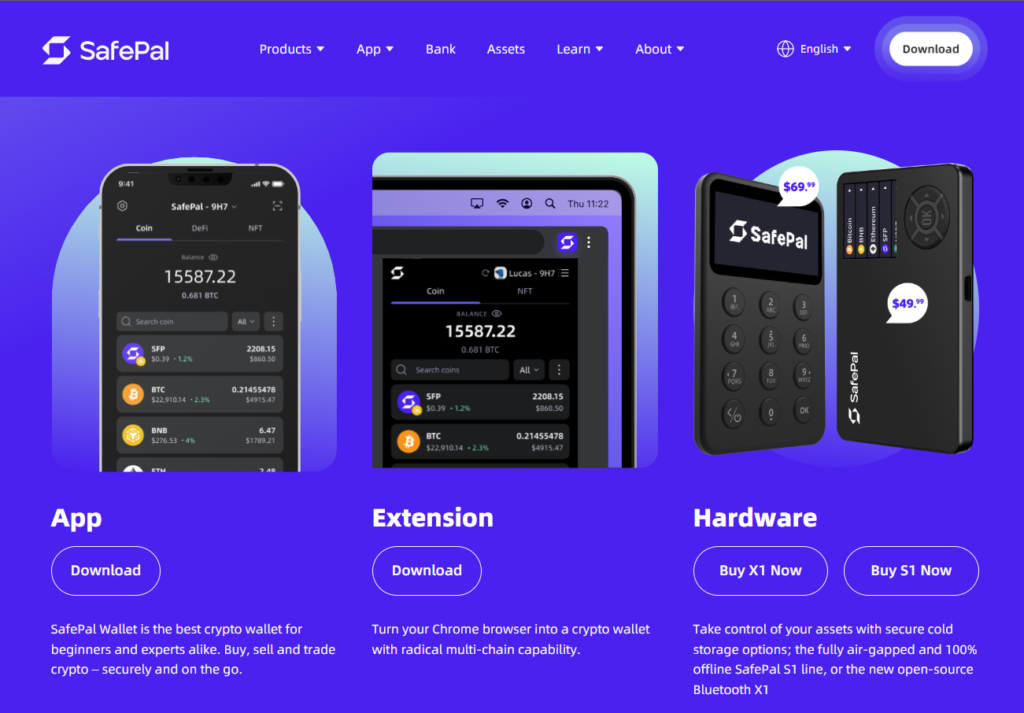
SafePal is a hardware and software wallet designed for maximum security and convenience. It supports a wide range of cryptocurrencies, making it versatile for traders and long-term holders.
SafePal’s standout feature is its air-gapped hardware wallet, which ensures your private keys never connect to the internet. This eliminates the risk of hacks or malware attacks.
The SafePal S1 hardware wallet uses multiple layers of security. These include a self-destruct mechanism, PIN code protection, and secure firmware updates. SafePal also has a mobile app that pairs seamlessly with the hardware wallet, allowing you to manage assets on the go. However, even with app connectivity, your private keys stay offline, ensuring complete safety.
Why SafePal is Safe
SafePal ensures top-notch security with its cold wallet for cryptocurrency approach. The hardware wallet operates offline, minimizing exposure to online threats. Additionally, it supports encrypted backups, making it easy to recover your wallet if lost or damaged.
Pros
- Air-gapped technology for offline security.
- Supports over 10,000 cryptocurrencies.
- Affordable compared to other best hardware wallets.
- User-friendly mobile app integration.
- Portable and lightweight design.
Cons
- Relies on the mobile app for full functionality.
- Not as durable as some premium hardware wallets.
- Lacks advanced DeFi integrations found in web wallets.
3. Trezor Wallet

Trezor is one of the most well-known and trusted best hardware wallets in the crypto community. It offers a high level of security, making it ideal for storing large amounts of crypto. Trezor supports over 1,000 cryptocurrencies and works seamlessly with a variety of third-party wallets and services.
The device operates offline, keeping private keys away from the internet and protecting your funds from online attacks.
Trezor’s Model T features a color touchscreen for easy navigation, while its One model offers a more basic design. Both models have PIN code protection, passphrase encryption, and recovery seed backup, which adds extra layers of security.
The wallet also features secure firmware updates to ensure it stays up-to-date with the latest security measures.
Why Trezor is Safe
Trezor’s top-notch security is due to its cold wallet feature, which keeps private keys entirely offline. It also uses a cryptocurrency wallet app for managing your assets securely. Furthermore, the Trezor wallet is resistant to physical attacks, thanks to its strong encryption and secure boot process.
Pros
- High-level security with offline key storage.
- Open-source software for transparency.
- Supports over 1,000 cryptocurrencies, including Ethereum and Bitcoin.
- Easy-to-use interface with a touchscreen.
- Strong customer support and regular firmware updates.
Cons
- Higher price point compared to other hardware wallets.
- Somewhat bulky compared to smaller options.
- Not the best for beginners due to the advanced security features.
4. Ledger Wallet
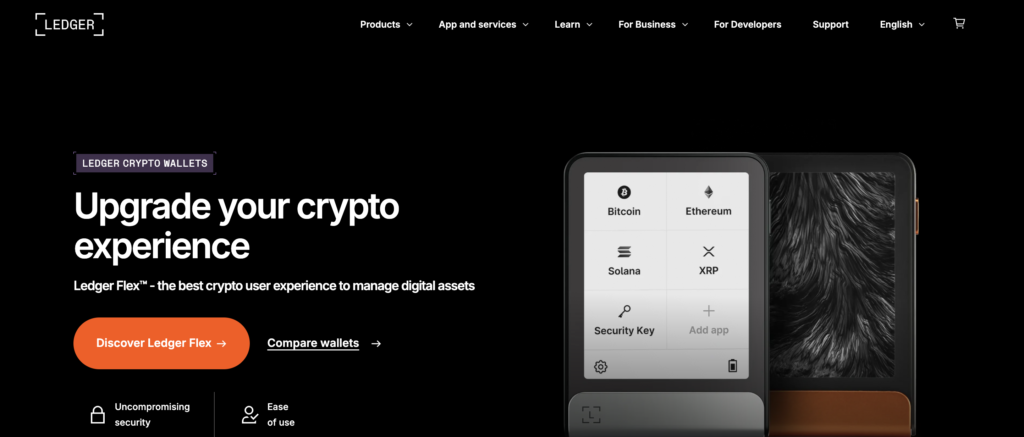
Ledger is another top contender in the world of best hardware wallets. Known for its advanced security features, the Ledger hardware wallet operates offline, keeping your private keys secure from online threats.
The Ledger Nano S and Ledger Nano X are the two primary models available, both supporting thousands of cryptocurrencies. The Ledger Nano X has Bluetooth connectivity, making it easier to manage your crypto through its mobile app, while the Nano S is more basic but still offers top-tier security.
Ledger’s Ledger Live app makes it easy to send, receive, and manage your assets across multiple blockchains. The wallet uses secure chip technology, making it resistant to hacking attempts. Each wallet is secured with a PIN code and recovery phrase, adding extra layers of protection.
Why Ledger is Safe
Ledger is often regarded as one of the most safe crypto wallets due to its use of cold wallet for cryptocurrency principles. Private keys are stored on the device and never exposed to the internet. Additionally, Ledger’s secure chip technology is designed to protect your keys from even the most advanced physical and software-based attacks.
Pros
- Robust security with offline private key storage.
- Supports a wide range of cryptocurrencies.
- Bluetooth connectivity with Ledger Nano X for mobile use.
- Excellent customer support and software updates.
- Easy to set up and use for both beginners and advanced users.
Cons
- Ledger Nano S has limited storage for apps, restricting the number of coins you can store.
- The Ledger Nano X is pricier than other hardware wallets.
- The Bluetooth feature of the Nano X could pose potential security concerns if not used correctly.
5. MetaMask Wallet
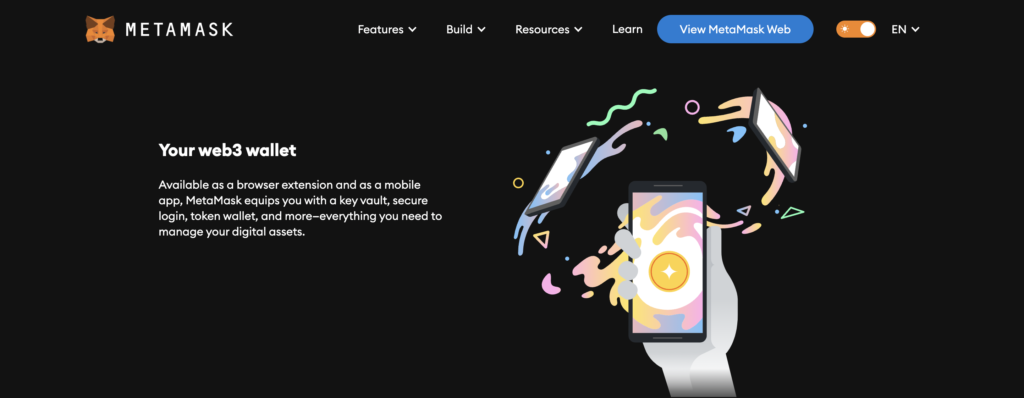
MetaMask is one of the most popular cryptocurrency wallet apps used for managing Ethereum and other ERC-20 tokens. It functions as a browser extension and mobile app, allowing users to interact with decentralized applications (dApps) and manage their crypto directly from their browser or phone.
Moreover, MetaMask makes it easy to send, receive, and store Ethereum-based tokens. Its simple interface is ideal for users who want to explore the world of decentralized finance (DeFi) and NFTs.
While MetaMask is a software wallet, it has strong security features. It allows users to store their private keys locally, which means the keys are not exposed to any third-party servers.
MetaMask uses a 12-word recovery phrase to back up your wallet, and its encryption ensures that only you can access your assets. It also supports hardware wallet integration, allowing users to connect a Ledger or Trezor for additional security.
Why MetaMask is Safe
MetaMask’s safety lies in its ability to store private keys locally and its integration with hardware wallets. While it’s an online wallet, users can increase security by connecting a cold wallet for cryptocurrency like Ledger or Trezor.
This setup provides an added layer of protection, making MetaMask suitable for users who want easy access to their funds without compromising security.
Pros
- Easy-to-use browser extension and mobile app.
- Supports Ethereum and ERC-20 tokens, as well as NFTs.
- Allows integration with hardware wallets like Ledger and Trezor.
- Supports dApp interaction and DeFi platforms.
- Open-source, meaning it’s constantly being reviewed and improved.
Cons
- Not a cold wallet on its own, making it less secure than hardware wallets.
- Vulnerable to browser-based attacks, like phishing.
- Limited support for coins outside of Ethereum’s ecosystem.
- Requires additional security measures, like hardware wallet integration.
6. Coinbase Wallet
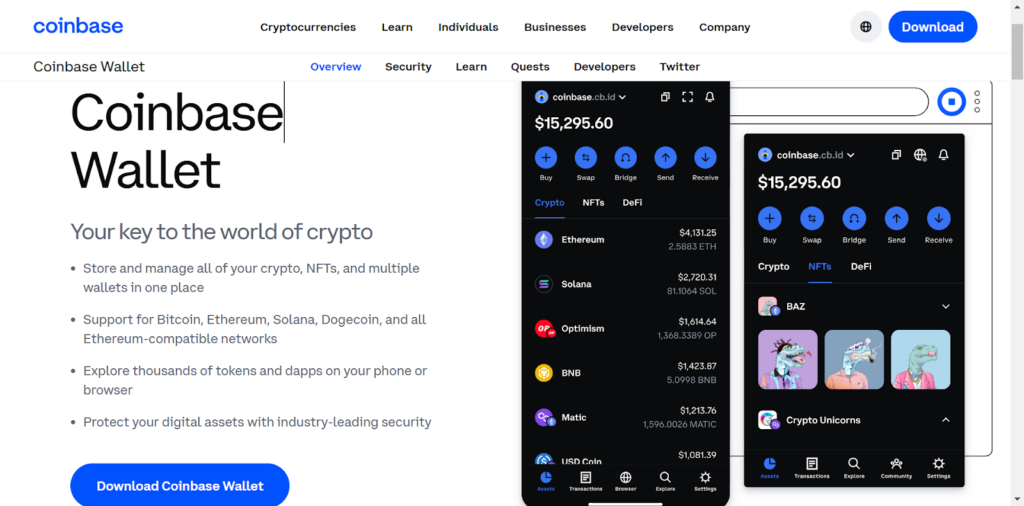
Coinbase Wallet is a popular cryptocurrency wallet app that allows users to store and manage their assets independently of the Coinbase exchange. Unlike the exchange’s custodial service, Coinbase Wallet gives users full control over their private keys.
The wallet supports a wide range of cryptocurrencies, including Bitcoin, Ethereum, and ERC-20 tokens. Coinbase Wallet also offers users the ability to manage NFTs and interact with decentralized apps (dApps), making it ideal for those who want to engage with the broader Web3 ecosystem.
Moreover, Coinbase Wallet provides a user-friendly interface and strong security features. It uses a 12-word recovery phrase to back up your wallet, and the private keys are stored locally on your device, not on centralized servers.
This gives you control and eliminates the risk of exchange hacks. The wallet also supports hardware wallet integration, allowing users to connect a Ledger or Trezor for added protection.
Why Coinbase Wallet is Safe
Although Coinbase Wallet is a hot wallet, it offers strong security measures to protect your funds. Storing private keys on your device ensures they are not exposed to third parties, and the 12-word recovery phrase ensures you can recover your assets if your device is lost or stolen.
For enhanced security, users can also integrate a hardware wallet, which is one of the most safe crypto wallet options for long-term storage.
Pros
- Easy-to-use app for managing cryptocurrencies and NFTs.
- Full control over private keys, unlike Coinbase’s exchange wallet.
- Supports a wide range of cryptocurrencies and dApps.
- Integration with hardware wallets like Ledger and Trezor for enhanced security.
- Strong backup and recovery options.
Cons
- Hot wallet—more vulnerable to online threats compared to cold wallets for cryptocurrency.
- Limited support for coins outside the Ethereum ecosystem.
- Requires additional security measures, such as hardware wallet integration, for optimal protection.
7. OKX Wallet

OKX Wallet is a versatile crypto wallet that is part of the OKX exchange ecosystem. It supports a wide variety of digital assets, including Bitcoin, Ethereum, and many altcoins. One of the key features of OKX Wallet is its seamless integration with the OKX exchange, allowing users to easily transfer assets between the wallet and their exchange account.
It also supports decentralized applications (dApps), NFTs, and Web3 functionality, making it a great choice for those looking to explore the decentralized finance (DeFi) world.
The wallet offers both a mobile app and a browser extension, providing flexibility in how you manage your crypto. It also supports multi-signature security features, enhancing the protection of your funds. OKX Wallet allows users to control their private keys, and it integrates with hardware wallets, giving you the option for an even more secure experience.
Why OKX Wallet is Safe
OKX Wallet is considered safe due to its integration of private key control and multi-signature security. Private keys are stored locally on your device, not on centralized servers, providing greater control over your funds.
The wallet also supports hardware wallet integration, allowing users to secure their assets with a cold wallet for cryptocurrency. This adds an additional layer of security, ensuring that users can manage their crypto safely even in the digital world.
Pros
- Supports a wide range of cryptocurrencies and NFTs.
- Integrates seamlessly with the OKX exchange for easy transfers.
- Supports multi-signature security for added protection.
- Allows integration with hardware wallets for enhanced security.
- User-friendly interface with mobile and browser extensions available.
Cons
- Hot wallet—more vulnerable to online threats compared to cold wallets for cryptocurrency.
- May not offer as many features as some other wallets for advanced users.
- Requires additional security measures, like hardware wallet integration, for optimal safety.
8. Bybit Wallet

Bybit Wallet is an integrated wallet within the Bybit exchange, providing users with an easy way to store and manage their digital assets. It supports a wide range of cryptocurrencies such as Bitcoin, Ethereum, and others.
One of the standout features of the Bybit Wallet is its seamless integration with the Bybit trading platform, allowing users to transfer funds quickly and efficiently between the exchange and their wallet. The wallet also supports staking and yield farming, making it a good choice for those looking to earn passive income on their holdings.
The Bybit Wallet offers strong security features, including multi-signature support, two-factor authentication (2FA), and a PIN code for access. Additionally, it has a recovery phrase system to back up and restore your wallet if your device is lost or damaged.
For those who prioritize security, Bybit Wallet allows integration with hardware wallets, offering an extra layer of protection for users’ private keys.
Why Bybit Wallet is Safe
While Bybit Wallet is a hot wallet, it offers enhanced security features such as multi-signature authentication and the ability to integrate with a hardware wallet for added protection. The wallet’s connection to the Bybit exchange ensures secure transactions.
However, like other hot wallets, it’s more vulnerable to online threats than cold wallets. To maximize security, integrating Bybit Wallet with a hardware wallet is highly recommended.
Pros
- Seamless integration with the Bybit exchange for easy transfers.
- Supports staking and yield farming for earning passive income.
- Multi-signature security and 2FA for added protection.
- Allows integration with hardware wallets like Ledger for enhanced security.
- User-friendly interface with mobile and web access.
Cons
- Hot wallet—vulnerable to online threats compared to cold wallets for cryptocurrency.
- Not the best option for long-term storage of large amounts of crypto.
- Requires additional security measures, like hardware wallet integration, for optimal safety.
9. Exodus Wallet

Exodus Wallet is a popular cryptocurrency wallet app known for its user-friendly design and a wide range of supported cryptocurrencies. It supports over 100 cryptocurrencies, including Bitcoin, Ethereum, and many altcoins. Exodus allows users to store, send, and receive digital assets with ease.
The wallet also integrates with a built-in exchange, allowing users to trade cryptocurrencies directly within the app. This makes it convenient for those who frequently swap assets.
Exodus Wallet has strong encryption and backup features, ensuring that your private keys are stored securely on your device. The wallet is non-custodial, meaning you retain full control of your funds.
It also provides a 12-word recovery phrase to back up and restore your wallet if necessary. For added security, Exodus can be integrated with a hardware wallet like Trezor, allowing for a higher level of protection for your assets.
Why Exodus Wallet is Safe
Exodus Wallet prioritizes user security with features like encryption and a 12-word recovery phrase. Your private keys are stored locally on your device, not on centralized servers, ensuring full control over your assets.
While Exodus is a hot wallet, it offers the ability to connect with cold wallets for cryptocurrency, like Trezor, to provide enhanced protection for long-term storage.
Pros
- User-friendly interface, ideal for beginners.
- Supports a wide range of cryptocurrencies (over 100).
- Built-in exchange for easy asset trading.
- Can be integrated with Trezor for added security.
- Provides encryption and backup options for peace of mind.
Cons
- Hot wallet—more vulnerable to online threats than cold wallets for cryptocurrency.
- Higher fees for in-app exchanges compared to external platforms.
- Not ideal for large amounts of crypto, unless integrated with a hardware wallet.
10. Trust Wallet
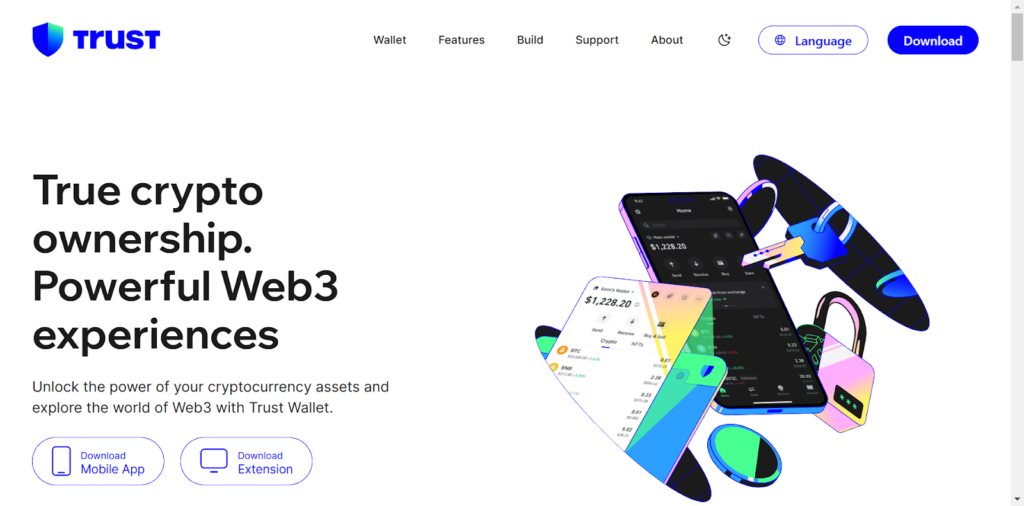
Trust Wallet is a popular cryptocurrency wallet app that supports a wide variety of digital assets, including Bitcoin, Ethereum, and many altcoins. Owned by Binance, Trust Wallet is fully decentralized and non-custodial, meaning you control your private keys.
The wallet allows users to send, receive, and store digital assets securely, and also provides access to decentralized applications (dApps) and Web3. This makes it ideal for users interested in DeFi, NFTs, and blockchain-based games.
One of the most notable features of Trust Wallet is its ability to store NFTs and interact with DeFi platforms. This gives it a unique edge for those exploring the decentralized world. Trust Wallet also supports staking, enabling users to earn passive income on select cryptocurrencies.
For security, Trust Wallet provides a 12-word recovery phrase and encrypts private keys on your device. This way you have full control over your assets.
Why Trust Wallet is Safe
Trust Wallet’s security lies in its non-custodial nature, meaning you have full control over your private keys, which are stored locally on your device. The 12-word recovery phrase ensures that you can recover your wallet if lost.
While Trust Wallet is a hot wallet, its integration with hardware wallets like Ledger and Trezor offers users an extra layer of security for long-term storage.
Pros
- Supports a wide range of cryptocurrencies and NFTs.
- Fully decentralized and non-custodial, providing control over your private keys.
- Easy to use and ideal for interacting with dApps and DeFi.
- Allows staking for earning passive income.
- 12-word recovery phrase for wallet backup and recovery.
Cons
- Hot wallet—more vulnerable to online threats compared to cold wallets for cryptocurrency.
- Lacks hardware wallet integration for users who want maximum security by default.
- Not as feature-rich as other wallets for advanced users.
What is the Most Safe Crypto Wallet for You?
Determining the most safe crypto wallet depends on your needs and preferences. The wallets we’ve discussed fall into three main categories: hardware wallets, desktop wallets, and app-based wallets.
Each offers unique benefits, but they differ in functionality, security, and user experience. Let’s explore these differences and provide recommendations to help you choose the right one.
1. Hardware Wallets
Hardware wallets are physical devices designed to store your cryptocurrency offline. They are often considered the safest option because they are not connected to the internet, reducing the risk of hacking.
Examples include:
- Trezor
- Ledger
- SafePal
Features of Hardware Wallets
- Offline storage of private keys.
- Protection against malware and online threats.
- Require physical confirmation for transactions.
Choose a hardware wallet if you want/are looking for:
- Maximum security for long-term storage.
- Offline protection from online threats.
- A secure way to hold large amounts of cryptocurrency.
2. Desktop Wallets
Desktop wallets are software applications you install on your computer. They are more secure than web-based wallets but less safe than hardware wallets since they remain connected to the internet.
Examples include:
- Exodus
Features of Desktop Wallets
- Easy access to funds from your computer.
- Some offer integrated exchanges for quick swaps.
- Often include portfolio tracking tools.
Choose a desktop wallet if you want/are looking for:
- A user-friendly wallet for daily transactions.
- A portfolio tracker alongside your crypto storage.
- A solution that balances usability and moderate security.
3. App-Based Wallets
App-based wallets are mobile or browser applications designed for convenience and accessibility. They are great for beginners and users who need quick access to their crypto.
Examples include:
- MetaMask
- TrustWallet
- Coinbase Wallet
- OKX Wallet
- Bybit Wallet
- Binance Wallet
Features of App-Based Wallets
- Easy to set up and use.
- Access to decentralized applications (DApps) and Web3.
- Many support staking and in-app exchanges.
Choose an app-based wallet if you want/are looking for:
- Convenience and quick access to your funds.
- Easy interaction with DeFi and DApps.
- A beginner-friendly option with basic security features.
For those looking for ultimate security, hardware wallets are the top choice. Trezor, Ledger, and SafePal offer best protection by storing your private keys offline, making them resistant to hacking attempts. These wallets are ideal for long-term storage of large amounts of crypto, as they offer enhanced protection against both online attacks and physical threats.
If you need a balance between security and convenience, MetaMask, Exodus, and Trust Wallet are solid options. While these are hot wallets, they still provide strong encryption and backup options like 12-word recovery phrases. For added security, you can connect them with hardware wallets like Trezor or Ledger to combine ease of access with cold storage protection.
For active traders or those deeply integrated into the crypto ecosystem, wallets like Binance Wallet, OKX Wallet, Coinbase Wallet, and Bybit Wallet are great options. They offer easy integration with exchanges and support multiple cryptocurrencies. However, they are hot wallets and less secure for long-term storage without additional security measures.
Conclusion
Choosing the most safe crypto wallet depends on your personal needs and how you plan to use your crypto. While there are many wallets available, the most secure ones are those that keep your private keys offline or in a highly secure environment, making them less vulnerable to online threats.
Ultimately, the most safe crypto wallet for you will depend on how much crypto you own, how frequently you access it, and your level of experience. Stay safe and make sure to choose the wallet that best suits your needs!
FAQs
These wallets store private keys offline, making them resistant to hacking and other online threats. Additionally, they provide user-friendly interfaces, robust encryption, and customer support, which increases their trustworthiness.
Since they do not rely on third-party servers, they are far less vulnerable than hot wallets (software wallets) that are connected to the internet.
These wallets also provide a recovery phrase, allowing you to restore your wallet if it’s lost or stolen. Trezor and Ledger wallets are considered the gold standard in terms of cold storage security.
For enhanced protection, users can pair these devices with a cryptocurrency wallet app like MetaMask or Trust Wallet, while ensuring they keep their backup phrases and passwords in a secure location.

 Learn
Learn  December 24, 2024
December 24, 2024  42 min.
42 min. 








